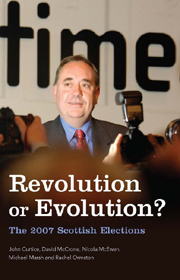Book contents
- Frontmatter
- Contents
- List of Tables
- Preface
- CHAPTER 1 A Watershed Election?
- CHAPTER 2 A Distinctive Scottish Voice? Identities, Values and Attitudes
- CHAPTER 3 What has Devolution Achieved? The Public's View
- CHAPTER 4 Governing Scotland: The People's Preferences?
- CHAPTER 5 Lost Labour Votes? Records, Personalities and Issues
- CHAPTER 6 How the SNP Won
- CHAPTER 7 Do Voters Care about Parties Any More?
- CHAPTER 8 A Personal Vote? How Voters Used the STV Ballot
- CHAPTER 9 Conclusion
- Technical Appendix
- Index
CHAPTER 4 - Governing Scotland: The People's Preferences?
Published online by Cambridge University Press: 12 September 2012
- Frontmatter
- Contents
- List of Tables
- Preface
- CHAPTER 1 A Watershed Election?
- CHAPTER 2 A Distinctive Scottish Voice? Identities, Values and Attitudes
- CHAPTER 3 What has Devolution Achieved? The Public's View
- CHAPTER 4 Governing Scotland: The People's Preferences?
- CHAPTER 5 Lost Labour Votes? Records, Personalities and Issues
- CHAPTER 6 How the SNP Won
- CHAPTER 7 Do Voters Care about Parties Any More?
- CHAPTER 8 A Personal Vote? How Voters Used the STV Ballot
- CHAPTER 9 Conclusion
- Technical Appendix
- Index
Summary
So far we have failed to detect much sign that the outcome of the 2007 election reflected a revolutionary break with the past. There is no evidence of a marked divergence between Scottish and English values, or of an intensification of Scottish national identity that might have contributed to the SNP's electoral success. Nor did the SNP's success and Labour's failure reflect growing dismay with the Scottish Parliament's ability to achieve the policy outcomes people want, or to involve Scots more in the process of government. The Scottish people had at least as much (or as little) faith in devolution and in the operation the Union at the time of the 2007 election as they had done in previous years.
But what of attitudes towards the SNP's central policy objective, indeed its raison d'être, that is Scottish independence? Surely the party's electoral success must have been accompanied by increased support for separation from the rest of the United Kingdom? After all, as we noted in chapter 1, the SNP had promised to hold an independence referendum if it secured office and its stance was discussed extensively during the election campaign. Or even if people did not want to go so far as to leave the United Kingdom the SNP's success must surely at least have denoted an increased wish for a radical shift of power away from London and towards Edinburgh? Experience suggested that heightened support for the SNP often produced an increased impetus towards self-government (Finlay, 2004; Mitchell, 1996).
- Type
- Chapter
- Information
- Revolution or Evolution?The 2007 Scottish Elections, pp. 56 - 71Publisher: Edinburgh University PressPrint publication year: 2009



